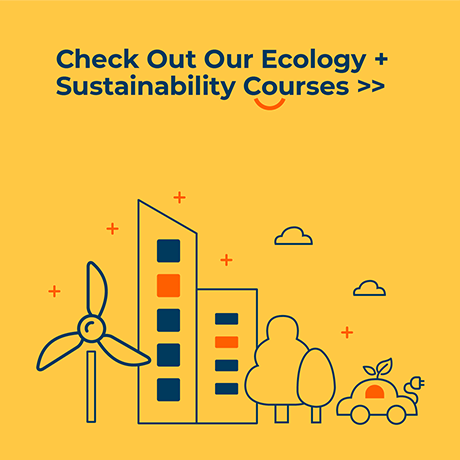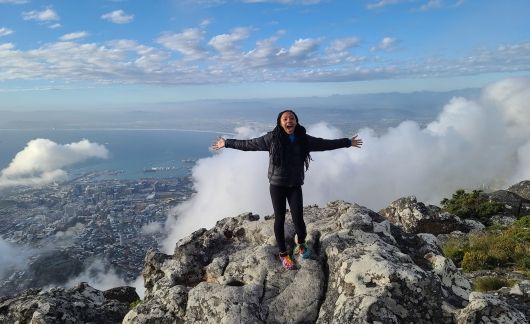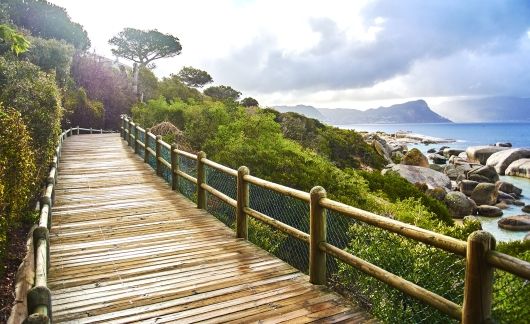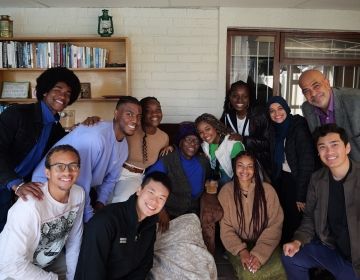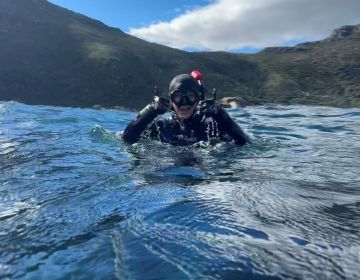
Ecology + Sustainability
Unique Experiences
EXPERIENCE A COASTAL FORAGING HIKE
NEAR DUIKER ISLAND, A MARINE PROTECTED AREA, TOLEARN ABOUT RARE MARINE SPECIES AND SUSTAINABLE HARVESTING
EXPLORE THE LESLIE HILL MOLECULAR ECOLOGY LABORATORY
LOCATED WITHIN THE UNESCO WORLD HERITAGE-LISTED CAPE FLORISTIC REGION, WHERE GENETIC AND ECOLOGICAL APPROACHES ARE USED TO INVESTIGATE AND CATALOGUE BIODIVERSITY
VISIT THE SOUTHERN AFRICAN FOUNDATION FOR THE CONSERVATION OF COASTAL BIRDS
TO EXPLORE SOUTH AFRICA’S UNIQUE SEABIRD LIFE AND LEARN ABOUT CUTTING-EDGE CONSERVATION EFFORTS TO PRESERVE ENDANGERED SPECIES
Your Destination
Cape Town is South Africa’s breathtaking, eco-conscious city, renowned for its rich biodiversity, conservation efforts, and innovative sustainability initiatives. The city seamlessly blends urban life with stunning natural landscapes, featuring iconic landmarks like Table Mountain, the Cape of Good Hope, and the vibrant V&A Waterfront. With a Mediterranean climate, unique ecosystems, and a strong focus on environmental preservation and renewable energy, Cape Town provides an inspiring environment for students. Whether you are majoring in environmental science, sustainability, marine biology, business, liberal arts, or public health, Cape Town is an ideal destination to study abroad.
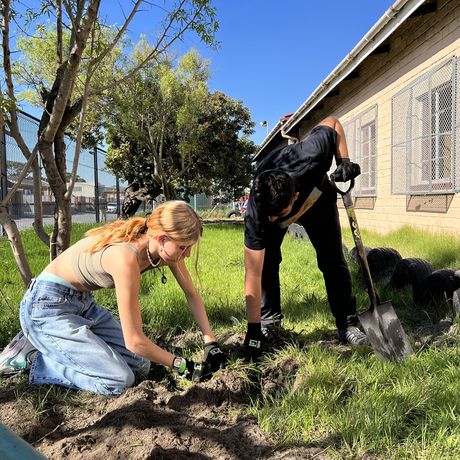
Program Highlights
- Featured Courses: Choose from a set of theoretical and practical Ecology and Sustainability courses that explore today's pressing environmental issues.
- Sustainability in Practice Workshop: Take part in an optional workshop to compare different models of sustainability in your host country and around the world. Topics may include business, public policy, technology, waste-management, and more.
- Immersive Experiences: Participate in activities and volunteer work on local farms, natural reserves, field stations, and more while applying real-life solutions to challenges in the fields of energy, waste management, and conservation.
- Academic Projects: Enroll in a for-credit internship, directed independent research project, or service-learning to connect with local leaders on environmental protection projects.
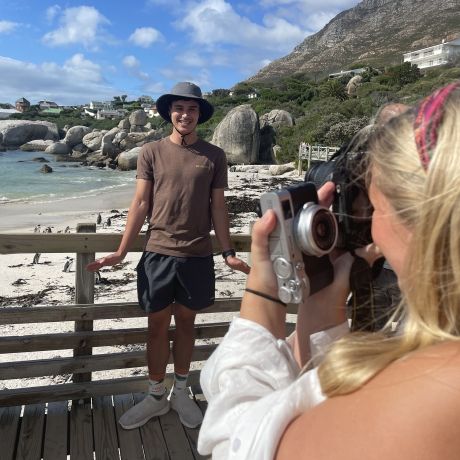
Excursions & Activities
CIEE’s excursions and cultural activities in Cape Town will open doors for you to explore South Africa’s rich diversity, language, culture, history, contemporary trends, vibrant art, and timeless beauty in ways that will enhance your time abroad.
Samples of excursions and activities:
- Explore Cape Town's eco-friendly trails and cycling routes, including Table Mountain, Lion’s Head, and the Sea Point Promenade, while connecting with nature
- Join eco-friendly kayaking and snorkeling tours along Cape Town's coastlines to explore the vibrant marine life and learn about conservation and sustainability practices
- Learn about sustainable urban farming techniques at community gardens and urban farms across the city, including permaculture and organic gardening
Please note: Activities are based on past programs and are subject to change at CIEE's discretion to adapt to local circumstances and participant feedback. Our goal when arranging activities is always to enhance your experience.
Program Blogs
Reflecting on South Africa as a Frederick Douglass Global Fellow
By: Sam Li Stepping off the plane in Cape Town felt like stepping into a whirlwind of vibrant energy, complex history, and breathtaking landscapes. This wasn't just any summer adventure... keep reading
South Africa Study Abroad: The Ultimate Guide
South Africa is simply astonishing. From its varied topography and rich culture to its complex history and diverse wildlife, a South Africa study abroad program promises the adventure of a... keep reading
The Cape Seal of Approval
Authored by Kai Edem (she/her) (Kai is a second-year undergraduate student at Agnes Scott College, majoring in Neuroscience. She is excited to discover more about research opportunities available during her... keep reading
Housing & Meals
Housing
CIEE Cape Town offers diverse housing options to ensure you're comfortable in your home away from home. In our single room or shared apartments, we will strive for your accommodation preferences to be met. All housing has convenient access to basic amenities including nearby medical care including pharmacies, shopping places, supermarkets, restaurants, and public transportation.
Standard Housing: Includes double accommodation in shared living arrangements within a 25-minute walk of CIEE Cape Town.
Select Housing: Includes single accommodation in shared living arrangements within a 25-minute walk of CIEE Cape Town. Select housing requires an additional fee.
A note: The default criterion to assign housing is first-come, first-served; however, other factors may also be considered. If we cannot accommodate your first housing choice, we'll let you know before you arrive.
Meals
Meals are not included. Students are responsible for purchasing and preparing their own meals in self-catering accommodation.
Academics
CIEE Cape Town: Study in the vibrant student-friendly suburb of Rondebosch near central Cape Town. CIEE Cape Town boasts two main classrooms, a small meeting room, a student lounge, a student life office, and an academic advising office.
University of Cape Town (UCT): CIEE has active institutional agreements with UCT as a host university which allows CIEE students to take courses from various departments – with all its courses offered in English. The University of Cape Town was established in 1829 and is home to 28,000 students and 5,000 staff representing more than 100 nationalities from Africa and abroad. The University has six faculties –Commerce, Law, Humanities, Engineering & the Built Environment, Health Sciences, and Science. It remains globally renowned for its academic excellence and commitment to social transformation, development, and equity.
Arizona State University (ASU): Brought to you by CIEE in partnership with ASU, enhance your international coursework with online classes that align with your degree requirements. ASU offers thousands of online courses in asynchronous 7.5-week sessions that fit within the CIEE academic calendar.
Course Information
- University of Cape Town follows the South African Higher Education Qualifications Framework (HEQF) credit system.
- 1 HEQF credit typically equals .222 U.S. semester credits and represents approximately 10 notional hours
- Most courses are worth 12-30 HEQF credits
- Courses may be taken in all University of Cape Town Departments, except Health Sciences and the Graduate School of Business.
Featured Courses
The Ecology + Sustainability program offers a rich curriculum that investigates the vital links between ecology, sustainability, and environmental policy. Students will explore diverse topics like energy solutions, ecosystem resilience, and the role of social justice in environmental action. With a focus on both theoretical and practical application, these courses provide students with the essential knowledge and multidisciplinary insights to confront the urgent environmental challenges facing our world today.
| CIEE Courses (in-person) | University of Cape Town (UCT) | ASU Courses (online) |
|---|---|---|
Principles of Ecology Global Change and The Environment Global Environmental Policy Sustainable Tourism | BIO3014S Conservation: Genes, Population & Biodiversity BIO3013F Global Change Ecology APG2038F/S Environment and Service II CIV1012S Sustainable Urban Infrastructure CIV1013S Environmental Chemistry for Civil Engineering EGS3021F Sustainability and Environment EGS3023F Anthropocene environment in perspective | Systems Thinking Sustainable Ecosystems Basic Energy Science |
Academic Projects
Biological and Physical Sciences
Social Sciences
Visual and Performing Arts
Agriculture
Business, Economics, Management, and Marketing
Engineering and Engineering Technologies
Natural Resources, Conservation, and the Environment
Below is a list of the faculties available at the University of Cape Town. For specific course listings, please refer to the UCT Handbook. Please note that not all courses within UCT faculties or departments are suitable for program participants, and many have prerequisites.
Faculties available to CIEE students at UCT:
- Faculty of Commerce
- Faculty of Engineering and the Built Environment
- Faculty of Humanities
- Faculty of Science
Sample Ecology and Sustainability courses which may be available:
APG2038F/S ENVIRONMENT & SERVICES II
Course outline: This course covers conventional and sustainable strategies for thermal comfort and servicing of small and medium scale buildings. The course facilities students to utilize literature, building science principles, experiments and simulations to analyze and apply sustainable building solutions. The subject matter in the first semester includes (i) sustainable low energy design methods for indoor space heating, cooling, ventilation and lighting (ii) small-scale embedded clean energy generation (iii) sustainable smart solutions for water and sanitation. Students explore these sustainable design approaches through analysis and documentation of existing building case studies. In the second semester, students focus on integration of sustainable principles and solutions in a building design project. This is extended into demonstration of fulfilment of the building regulations for energy efficiency and the applicable regulations for water and sanitation. Technical documentation is undertaken using architectural drawing conventions. Students must also make a business case for their sustainable Lecture times: Refer to departmental timetable design proposals.
CIV1012S SUSTAINABLE URBAN INFRASTRUCTURE
Course outline: The concept of designing sustainable cities frames the course. It lays the foundations for understanding civil engineering infrastructure in the context of rapid urbanization. It locates civil engineering in the broader context of sustainable development goals in relation to the interaction between urban infrastructure, people, and the planet. The course is a project-based course which integrates principles of teamwork, technical communication, independent learning and personal efficacy into a design project.
CIV1013S ENVIRONMENTAL CHEMISTRY FOR CIVIL ENGINEERING
Course outline: This course aims to introduce fundamental chemistry and environmental chemistry concepts and applications in the engineering sphere, which is a big challenge in South Africa. The course introduces the students to basic chemistry topics like the structure of the atom, chemical properties, and organic and inorganic chemistry. Furthermore, students are presented with the core areas of environmental engineering, which are water quality, air quality and Solid Waste Management and chemistry related to these topics. This should equip the graduate with skills to identify environmental risks, the related chemical reactions and possible treatment or mitigation applications. Extra envious is to treat water standards provided to end-users.
EGS3021F SUSTAINABILITY & ENVIRONMENT
There is a compulsory fieldwork component involving a half-day field excursion.
Course Outline: The course critically engages with current debates and discourses in the fields of sustainability, vulnerability and environmental management, including examination of key concepts such as integration, systems-thinking, complexity, equity, vulnerability, risk, resilience, adaptation and mitigation. Approaches and methods for analyzing environmental problems and integrating risk reduction as well as sustainability principles and practices into policy, program, plan and project cycle processes are investigated and applied in different contexts.
EGS3023F ANTHROPOCENE ENVIRONMENTS IN PERSPECTIVE
Course Outline: The course deals with the dynamic physical environment including the human impact on global environments at various spatial and temporal scales during the so-called Anthropocene. The general aim of this course is to illustrate the nature and scale of changes that characterize the earth’s environment, against a background of both natural and anthropogenically induced processes. This provides an important perspective when thinking about contemporary environments and how they might change in the future – with obvious consequences for our own species and that of the others with which we share the planet.
CIEE proudly partners with ASU to deliver asynchronous, 100% online coursework that aligns with your degree requirements from anywhere you study abroad.
CIEE and ASU offer courses online per program eligibility, at no additional charge. Be sure to review online courses with your home school advisor.
Check the CIEE Program Dates and ASU start dates below to maximize course options within your program!
Search ASU Online Courses BROWSE FAQs for more INFO
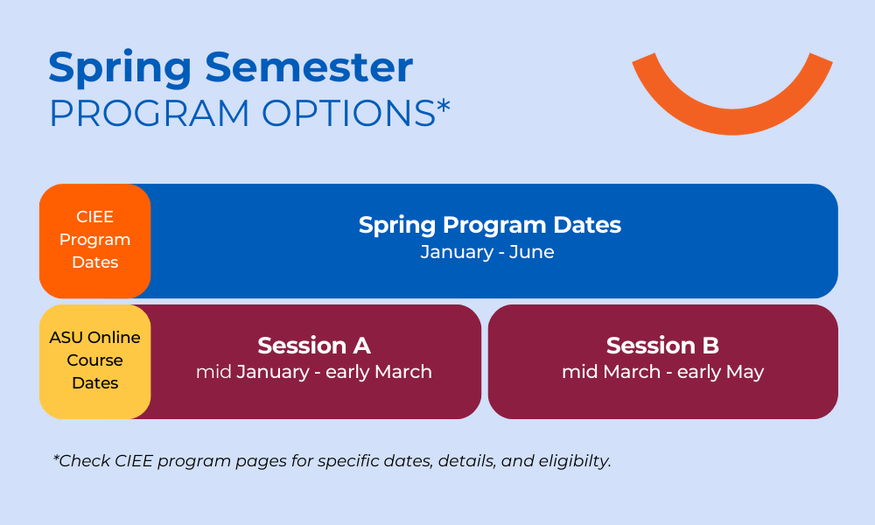

Note: This course listing is for informational purposes only and does not constitute a contract between CIEE and any applicant, student, institution, or other party. The courses, as described, may be subject to change as a result of ongoing curricular revisions, assignment of lecturers and teaching staff, and program development. Courses may be canceled due to insufficient enrollment.
"(GI)" denotes courses that originated at CIEE's Global Institutes and that are offered at multiple CIEE sites.
Discover Internship Opportunities
We're excited you're considering this program! Next, explore the types of internships you can choose from for an epic internship abroad with CIEE Study Abroad.
Explore Industry Options
The work culture in Cape Town is laid-back yet professional, emphasizing work-life balance, creativity, and innovation. Interns can expect to work with local NGOs, startups, or established businesses. There’s a strong sense of community, and colleagues often socialize after work in a friendly, multicultural environment.
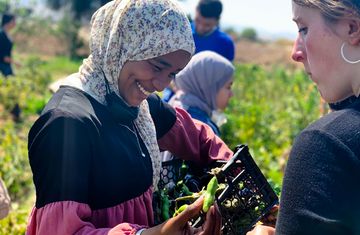
Agriculture, Food and Natural Resources
Gain experience in agricultural markets, agribusiness companies, and NGOs to study food production and global processes.

Architecture and Construction
Develop hands-on technical skills and responsible building planning while working for global architecture firms abroad.

Information Technology
Explore diverse tech environments, cutting-edge innovation, and emerging technologies in South Korea, Spain, and more.

Law, Public Safety, Corrections and Security
Experience international legal systems, global justice issues, and law enforcement challenges in courts, firms, and agencies.

Marketing, Sales and Service
Explore global market dynamics, cross-cultural consumer engagement, and sales techniques in firms, agencies, and companies.

Science, Technology, Engineering and Mathematics
Gain hands-on skills in sustainable technologies, research projects, and scientific studies in Costa Rica, Mexico, and more.
Browse Internship Opportunities
Explore internship placements available through this program to find the right fit for your academic and professional goals.
Disclaimer: Internship placements are subject to availability and host employer hiring discretion. Application and payment of CIEE fees does not guarantee specific placement. This internship listing is for informational purposes only and does not constitute a contract between CIEE and any applicant, student, institution, or other party.
Scholarships & Grants
CIEE offers scholarships and grants annually to help students like you make your study abroad dream a reality.
Students who apply to this program are eligible for the following scholarships and grants:
- Wollitzer Merit Scholarships in Area or Comparative Studies
- Ping Scholarships for Academic Excellence
- CIEE Gilman Go Global Grant
To be considered, submit the CIEE Scholarships & Grants application within your CIEE program application.
Dates & Fees
You get more for every dollar when you study abroad with CIEE, because our high-quality programs include everything from excursions to insurance. There are no hidden charges, and no disappointing surprises when you arrive.
Program |
Application Due |
Start Date |
End Date |
Fees & Housing |
|---|---|---|---|---|
| Program Spring 2026 18 weeks | Start Date * | End Date * |
*Dates for this program are provided as tentative dates. Please consult with your study abroad advisor to confirm dates before purchasing your flights.
To help you budget, keep in mind that students are responsible for the cost of international airfare, local transportation, books and supplies, visas, and personal expenses. In addition, your college or university may charge additional fees for study abroad, or may require you to receive a transcript via CIEE's School of Record, which carries an additional fee of $500.
Program Fees
CIEE offers the most student support of any provider in its program fee, including an airport greeting, full-time leadership and support, orientation, cultural activities, local excursions, pre-departure advising, and CIEE iNext travel protection with benefits.
Financial Aid
CIEE offers the most grants and scholarships of any study abroad organization, including $8 million/year in travel grants, merit-based scholarships, institutional and MSI grants, and Gilman Go Global Grants.
Estimated Costs
Students are responsible and manage costs related to travel, meals, books, and personal expenses. Below are estimates for consideration.
What's Included
Tuition
Housing
Pre-departure Advising
Advising before you depart to set goals and answer questions
Optional on-site airport meet-and-greet
Orientation
Introduction to your program plus practical information about living in your host city
On-site Staff
Full-time program leadership and support in your city
Cultural and/or Co-curricular Activities
Excursions and/or Study Tours
Travel Protection
CIEE iNext travel protection
24/7 emergency on-site support
Our Staff
Nompilo Ndlovu
Center Director
Dr. Nompilo Ndlovu has over a decade of experience working within the academic, policy and non-profit sectors, focused on the African continent.
Thandeka Dladla
Student Life Manager
Thandeka holds a Bachelor of Music degree from the University of Cape Town (UCT). She worked as a mentor and teacher at the Butterfly Project, an education-based NGO focused on...
Get Started
1
2
Connect With Your Campus Study Abroad Office
Share your plans and confirm you're on track to meet all required steps to go abroad.
3
Contact CIEE
We're here to help! Send us an email if you still have questions or need information about applying to this program.
4
Interested in an optional internship?
After being accepted to this program and submitting the required internship documents, work with CIEE staff on your internship goals and select which positions to interview for. CIEE will reach out to companies that would be a good fit for you, your interests, and your qualifications. Finalize your internship placement upon arrival!
